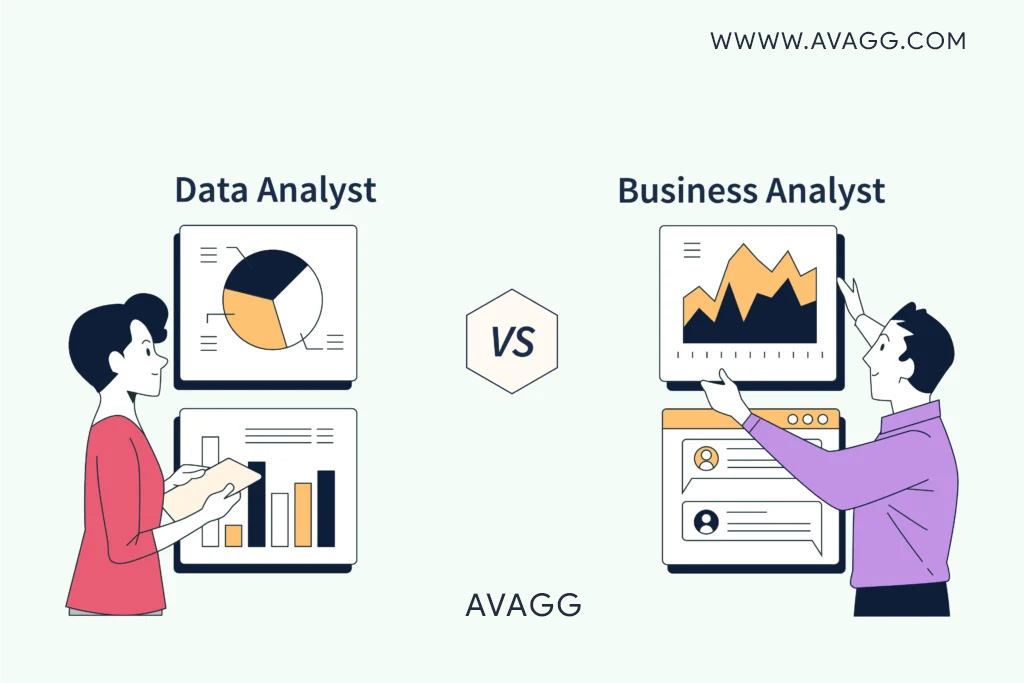
In the fast-paced world of data-driven decision-making, the roles of Business Analyst (BA) and Data Analyst (DA) are frequently discussed—and sometimes confused. Both roles have unique responsibilities and skillsets, yet they complement one another in the corporate landscape. Here, we’ll clarify the differences between these two roles and how each adds value to an organization. By understanding their distinctions, you can decide which path aligns best with your goals, or how both roles can be essential to the success of your business.
What Does a Business Analyst Do?
A Business Analyst focuses on the big picture of business objectives and strategies. They’re responsible for understanding organizational needs, identifying areas for improvement, and recommending solutions. Typically, a BA works closely with stakeholders to bridge the gap between IT and the business. Their goal is to ensure that IT solutions align with the company’s overall strategy and objectives.
- Key Responsibilities:
- Gathering and analyzing business requirements
- Conducting feasibility studies
- Modeling business processes
- Translating business needs into technical specifications
- Assessing impact and change management
- Skills Required:
- Strong communication and stakeholder management skills
- Problem-solving and critical thinking
- Basic understanding of IT systems
- Strong command of tools like Excel, Power Bi and Tableau
- Familiarity with business process modeling techniques
What Does a Data Analyst Do?
A Data Analyst, on the other hand, is more focused on data gathering, analysis, and reporting. Their primary role is to collect and process data, uncovering trends and patterns that inform business decisions. Data Analysts often work with large data sets, employing statistical and analytical tools to extract actionable insights.
- Key Responsibilities:
- Data collection, cleaning, and preparation
- Using statistical and analytical tools for data interpretation
- Creating visualizations to communicate findings
- Generating reports that inform decision-making
- Skills Required:
- Proficiency in statistical analysis and data visualization
- Strong command of tools like Excel, SQL, Python, and Tableau
- Ability to work with large data sets and databases
- Problem-solving with a quantitative approach
Key Differences Between Business Analysts and Data Analysts
- Focus:
- Business Analysts prioritize business needs and goals; they translate high-level requirements into functional specifications.
- Data Analysts focus on data to draw insights that can directly impact business operations and decision-making.
- Tools and Techniques:
- Business Analysts rely more on process modeling tools, documentation, and stakeholder interviews.
- Data Analysts use statistical tools, data visualization software, and programming languages.
- Outcome:
- The work of a Business Analyst often results in strategic recommendations or project plans.
- Data Analysts deliver data-driven insights that answer specific business questions.
Choosing the Right Path: Which Role Suits You?
If you are interested in understanding business processes, collaborating with stakeholders, and aligning IT with business goals, a Business Analyst role may be a great fit. Alternatively, if you are passionate about working with data, leveraging analytics tools, and extracting insights from complex datasets, then a Data Analyst role could be ideal for you.
Both roles are essential in today’s data-driven world, with businesses increasingly needing insights that align with strategic goals.
Final Thoughts
In short, while Business Analysts and Data Analysts may occasionally share skills and responsibilities, each role has its unique focus. Together, they empower organizations to make informed, strategic, and data-backed decisions. If you’re a business looking to unlock the full potential of both roles, having a team that includes both BAs and DAs can be a powerful asset.
Ready to harness the power of business and data analysis to grow your organization? Contact Aditya V Agarwal & Company today to see how our expert team can help your business achieve its goals. Visit www.avagg.com and take the next step towards data-driven success!

That’s a great point about player experience – so crucial for keeping things fun! Just discovered jililive app casino & the easy setup is a huge plus. Seems like they’re really focused on making it accessible, especially with that app!
Looking for a new spot? jjwin01.com might be it, I have heard good things. Just depo’ed! Wish me luck! I think they provide good services here jjwin01.
888Bet777 – that’s a lot of lucky numbers! I had a surprisingly good experience there. The customer support was actually helpful when I had a question. Plus, who doesn’t love triple sevens? 888bet777
Immersive live dealer games are so much fun! Seeing the quick deposit options like GCash at j77 casino club makes getting in on the action seamless. Great RTP rates are key for a good experience, too!
Great article! Having worked in both tech and business sectors, I see how these roles create synergy. The BA’s strategic vision combined with the DA’s analytical depth drives innovation. Just as phkkk login streamlines user access, effective BA-DA collaboration streamlines business insights and decision-making processes.
It’s fascinating how easily we fall into patterns when gaming – loss aversion is real! Seeing platforms like gperya com focus on competitive play & analytics is smart; it acknowledges that psychological aspect. Account verification seems thorough, too – good security is key for trust!
Really interesting points about immersive experiences! It’s cool to see platforms like jili8888 slot blending tech with classic games – especially with those local payment options. Makes it super accessible for everyone!
This comparison perfectly captures the distinction! As someone who works in analytics-driven platforms like kkk ph online casino, I see how BAs shape strategy while DAs unlock actionable insights from raw data. Both roles are invaluable for data-informed decision-making.
That’s a great point about accessibility in shooters – often overlooked! Secure platforms like bf777 download apk are key for smooth, worry-free gaming, especially with quick deposits via GCash. It’s all about ease & trust, right? Really enhances the experience!